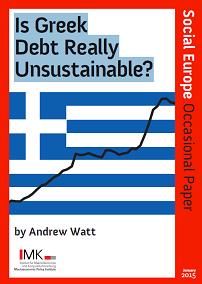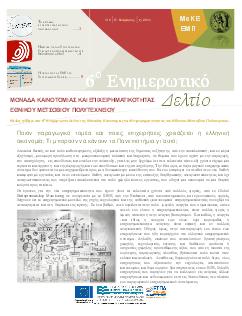Gechert, S. & Rannenberg, A. (2015) “The costs of Greece’s fiscal consolidation“, Macroeconomic Policy Institute, Μάρτιος. This policy brief reexamines the effects of the Greek austerity experiment on its economy via a counterfactual analysis. We combine the fiscal multipliers from the meta regression analysis in Gechert and Rannenberg (2014) to the fiscal consolidation measures that have been implemented in Greece between 2010 and 2014. We estimate that austerity explains …Read More
Greece: update on public finances – the State primary budget balance has returned almost in line with the target, but mostly due to expenditure cuts. Revenues continue to underperform
Merler, S. (2015) “Greece: update on public finances – the State primary budget balance has returned almost in line with the target, but mostly due to expenditure cuts. Revenues continue to underperform“, Bruegel Institute, 16 Μαρτίου. At the end of last week the Greek Finance Ministry published the preliminary budget execution bulletin for February. The State primary budget balance has returned almost in line with the target, but mostly …Read More
The Political Economy of the Greek Debt Crisis: A Tale of Two Bailouts
Ardagna, S. & Caselli, F. (2015) “The Political Economy of the Greek Debt Crisis: A Tale of Two Bailouts“, Centre for Economic Performance Special Paper, Special Paper No. 25, Ιανουάριος 2014. We review the events that led to the May 2010 and July 2011 bailout agreements. We interpret the bailouts as outcomes of political-economy equilibria. We argue that these equilibria were likely not on the Pareto frontier, and sketch …Read More
Sovereign default and debt restructuring: Was Argentina’s ‘haircut’ excessive?
Edwards, S. (2015) “Sovereign default and debt restructuring: Was Argentina’s ‘haircut’ excessive?“, VoxEU Organisation, 04 Μαρτίου. There were 24 sovereign defaults and debt restructurings between 1997 and 2013. Using data on 180 debt restructurings – for both sovereign bonds and sovereign syndicated bank loans – this column argues that the roughly 75% ‘haircut’ Argentina imposed on its creditors in 2005 was an outlier. Greece’s ‘haircut’ of roughly 64% in …Read More
Greece and primary surpluses
Wren-Lewis, S. (2015) “Greece and primary surpluses“, Mainly Macro Blog, 24 Φεβρουαρίου. In my simple guide to the current macroeconomic position of Greece, I said that a major mistake made by the Troika was to insist on a pace of fiscal adjustment that was far too fast. It led to a collapse in the economy. Of course a collapse in the economy itself raises the deficit. So people who …Read More
Greece – a Varoufakis Conversion
Cook, C. (2015) “Greece – a Varoufakis Conversion“, Pieria Online, 06 Φεβρουαρίου. Greece’s new Syriza government has two major economic challenges to address: a Resolution of Greece’s unsustainable debt burden followed by a Transition to a long term sustainable economy. Conventional resolution of sovereign debt is a debt for debt swap: replacing existing debt with new debt which requires a smaller percentage of Greece’s national income and resources to …Read More
Is Greek Public Debt Unsustainable? It’s The (nominal growth rate of the) Economy, Stupid!
Watt, A. (2015) “Is Greek Public Debt Unsustainable? It’s The (nominal growth rate of the) Economy, Stupid!“, Social Europe Journal, Occasional Papers No. 6, Ιανουάριος. Greece will go to the polls on January 25th and everybody from German conservatives to Greek leftists seems to agree: Greek public debt is unsustainable. A haircut on investors and some form of partial default – more politely known as debt restructuring – is …Read More
Why Grexit would not help Greece – debunking the myth of exports
Wolff, Β. G. (2015) “Why Grexit would not help Greece – debunking the myth of exports“, Bruegel Institute, 06 Ιανουαρίου. The genie is out of the bottle: Europe is again discussing the possibility of Greece leaving the euro. With it, the debate has re-emerged whether this would be helpful or not for Greece and whether there would be contagion to other euro area countries. A big question is, of …Read More
The Greek Turnaround: Mending the Fragility and at What Price
Panagiotarea, E. (2014) “The Greek Turnaround: Mending the Fragility and at What Price“, στο: Europe – Surging Ahead, Panorama – Insights into Asian and European Affairs, 02/2014, σσ. 59-70, 19 Δεκεμβρίου. Introduction Greek economic adjustment was never going to be an easy task. For one, the starting imbalances were grave, hidden from view by years of budgetary misreporting and rudimentary surveillance, while the country’s institutional capacity to undertake and …Read More
Πώς επενδύουν οι ελληνικές επιχειρήσεις στο εξωτερικό; (1/2) Άμεσες Ξένες Επενδύσεις
Γιακούλας, Δ. (2014) “Πώς επενδύουν οι ελληνικές επιχειρήσεις στο εξωτερικό; (1/2) Άμεσες Ξένες Επενδύσεις“, Μονάδα Καινοτομίας και Επιχειρηματικότητας Εθνικού Μετσόβειου Πολυτεχνείου, 6ο Ενημερωτικό Δελτίο, 06 Νοεμβρίου 2014. Οι Άμεσες Ξένες Επενδύσεις αποτελούν την πιο προωθημένη επιλογή διεθνοποίησης της επιχείρησης και θεωρούνται ως ουσιαστικός μοχλός οικονομικής ανάπτυξης είτε άμεσα είτε μέσω αποτελεσμάτων διάχυσης. Οι ελληνικές άμεσες επενδύσεις στο εξωτερικό και ο ρόλος τους στην εγχώρια ανάπτυξη βρέθηκαν στο επίκεντρο του …Read More







